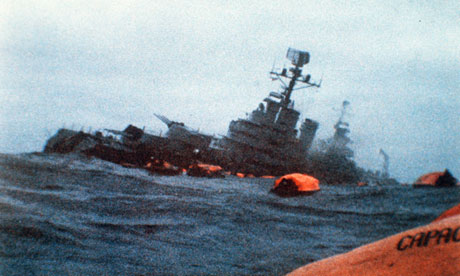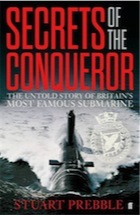Secrets of the Conqueror by Stuart Prebble – review
Andy Beckett on the men who sank the Belgrano and what they did next

The General Belgrano sinks after being torpedoed. Photograph: Str/AP
Of all the mysteries and controversies around the Falklands war, that patchily reported, pivotal confrontation 30 years ago, some of the deepest involve submarines. Did Britain seriously consider threatening Argentina with submarine-launched nuclear missiles, as has sometimes been alleged, if less apocalyptic tactics failed? Was Argentina dissuaded from launching an earlier invasion of the islands, in 1977, by Margaret Thatcher's less bellicose but militarily shrewder predecessor, Jim Callaghan, who despatched a submarine to the south Atlantic as a deterrent? And most infamously, why exactly was the elderly Argentinian cruiser Belgrano sunk by a British submarine in May 1982, killing 323 sailors and hugely escalating the Falklands conflict?
This book touches tantalisingly on the first two questions but only seriously addresses the third. Prebble's subject, the attack submarine HMS Conqueror, whose history and on-board culture he describes with compelling intimacy but sometimes questionable reverence, torpedoed the Belgrano. He is also good on the broader, murky business of undersea warfare. In the early 80s, submarines could still easily hide, but also slid through the oceans semi-blind. Their tightly bonded crews habitually kept quiet about their missions whenever they resurfaced. "Submariners have an air about them," he writes, "which seems to hint that they know things the rest of us can never know."
- by Stuart Prebble
Secrets of the Conqueror: The Untold Story of Britain's Most Famous Submarine

The Conqueror was a fat, finned sea monster of a vessel, nuclear-powered but not nuclear-armed, used by the Royal Navy from 1971 to 1990. The stories Prebble has prised from its crewmen, some named and some not, go beyond the Belgrano incident and its highly charged aftermath, and into waters previously uncharted by journalists and historians. From this testimony, and other, guardedly described research - there are no footnotes or lists of primary sources, only a brief bibliography made up mostly of standard histories - he has extracted quite a scoop: that both shortly before and shortly after the Falklands war, the Conqueror undertook a bizarre but ultimately successful cold-war mission which has remained secret ever since.
In August 1982, "close to, or inside, the territorial waters of the USSR", probably near the Soviet naval base of Murmansk, the submarine stole a giant eastern bloc undersea listening device. A long, thick metal cable strung with unusually effective underwater microphones and designed to be towed by a submarine or surface vessel, the stolen device was an important component in both the maritime balance of power and east-west espionage. Britain and America, writes Prebble, needed to know whether the cable had been developed by the Russians or copied from similar western technology by Soviet agents. With typical, baffling-to-civilians services humour, the Royal Navy called the undersea heist Operation Barmaid.
Prebble is a veteran TV producer, and in the introduction he talks up his exclusive in the style of a press release or the breathless opening minutes of a modern documentary, as "a tale as incredible as the exploits of James Bond, straight out of John le Carré". Some of the story of how Prebble got it is threaded through the book, mildly self-congratulatory journalistic reminiscences running alongside the sterner military history.
As a young producer in the mid-80s, he had made a Belgrano film based around an interview with an unusually forthcoming former junior officer from the Conqueror, Narendra Sethia, who had kept a diary that dealt in detail with the Argentinian ship's sinking. Sethia and his diary had been drawn into the vortex of smears, cover-ups and revelations that followed the torpedoing, but he had been happy with Prebble's programme, and afterwards invited him to his wedding in south London. "Later that day I found myself in a nearby public house with several of the former crew of the Conqueror," writes Prebble. The conversation turned to an infamous missing six months in the official log of the submarine's activities, including the Belgrano incident, which Sethia – wrongly – had been accused of stealing. With a little prompting from the ex-submariners, Prebble suddenly came to a realisation. Much more of the log had disappeared than the few days dealing with the Belgrano: "Perhaps what was being hidden was not to do with the [Falklands] war." He cagily continues: "One way and another, in the course of the remainder of that evening and after some other enquiries in the following days, I learned about … Operation Barmaid."
With the cold war still going on, he quickly – too quickly? – decided that Barmaid was too sensitive to "national security" to reveal to the public. He would wait until a less delicate moment. For quite a few chapters, the reader waits for the story of Barmaid too. Nonfiction books that are labours of love can have their disadvantages, such as the desire to include every scrap of material, and instead there are long, extraneous passages about the off-duty exploits of the Conqueror's sailors, and about Sethia in particular, his family background and his post-navy life running a yachting business in the Carribbean. In the hands of a more novelistic writer, this could add up to more than padding and colour: there is clearly a connection between the elaborate pranks played on each other by the submariners and the slyness and cheek of the Barmaid plan, but Prebble is too fond of blokey anecdotes about naughty sailors in "some of the most exotic locations in the world" to properly draw it out.
Excited stuff about the Conqueror as "a state-of-the-art fighting machine" and submarines as "the chariots of modern war" also mars the early pages. But once the submarine puts to sea for its cold war and Falklands missions, the tone shifts. Prebble writes concretely and well about the vessel and life on board it: the impossibly tight spaces, the incessant hums and smells, the lack of exercise, the absence of nature except for the potentially crushing mass of water all around.
The attack on the Belgrano is described clearly, blow by blow. "Late that morning … the captain announced to the crew that they had orders to sink the Belgrano and that after lunch they would be going to action stations." Before condemning the Argentinians to burn, freeze or drown, the submariners ate "roast pork with all the trimmings". After the sinking, some of the submariners were "all pumped up"; others were stunned and introspective.
The account holds no bigger revelations. These come instead, at last, in two dozen concluding pages on Operation Barmaid. Back at base in Scotland after the Falklands, the Conqueror was secretly fitted with two pairs of giant pincers. Then it slipped out to sea to intercept an eastern bloc trawler that had been spotted towing one of the sought-after listening cables. With canny, patient navigation, the submarine rose slowly upwards beneath the trawler, to within "a few feet" of its engine propellers, without being detected. Then one pair of pincers cut through the cable, roughly, to make the break look like an accident. The other pair grabbed the severed section before it sank to the sea floor. And the Conqueror ghosted away with its precious cargo.
Once the submarine docked in Scotland again, "within hours" the cable "was on its way to Prestwick airport for a flight across the Atlantic for analysis". What our American allies learned from the seized listening device, and whether the Russians saw its disappearance as suspicious, Prebble, despite his own impressive display of patience and ingenuity here, does not know. Some of the secrets of the Conqueror, like many of those of the cold war, elude us still.
Source: The Guardian, UK.
No comments:
Post a Comment